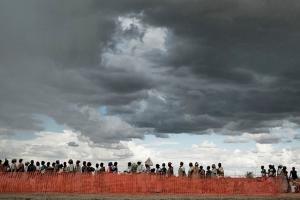UN warns of ‘hunger catastrophe’ for South Sudanese children
Two United Nations humanitarian agencies called for action to stop a potential famine in South Sudan which they said is being allowed to happen, just as it occurred in Somalia and the Horn of Africa three years ago.

Beneficiaries waiting in line to collect their ration at a food-distribution taking place at the UNMISS-compound in Malakal, Upper Nile State, South Sudan (May 25, 2014).
“The world should not wait for a famine to be announced while children here are dying each and every day,” said Anthony Lake, Executive Director of the UN Children’s Fund (UNICEF). “We all have to do more, and quickly, to keep more children alive.”
Mr. Lake and World Food Programme (WFP) Executive Director Ertharin Cousin visited with displaced families seeking shelter at a UN base in Malakal, in the Upper Nile state of South Sudan.
The agency heads said they fear a repeat of famines in other parts of the world, where early warnings of extreme hunger and escalating malnutrition went largely unheeded until official famine levels were announced.
“WFP, UNICEF and our partners here on the ground have been working tirelessly to bring assistance,” said Ms. Cousin. “But if we are to rapidly expand our operations and save more lives, then we need more resources, and the international community has to act now.”
Nearly one million children under five years of age in South Sudan will require treatment for acute malnutrition in 2014, according to the UN. In addition, one out of every three people in the country, the equivalent of 3.9 million people, is estimated to be dangerously food insecure.
An estimated 1.5 million people have been uprooted in fighting that started with a political impasse in mid-December 2013 between President Salva Kiir and former Vice President Riek Machar.
At a press briefing in Geneva, WFP spokesperson Elisabeth Byrs said that the situation was particularly worrying for displaced people who have not been able to plant crops this year.
If the world fails to provide the help needed right now to accelerate and scale up life-saving food and nutrition efforts, UNICEF estimates that 50,000 children could die from malnutrition in the course of this year.
In addition, the children are at further risk from insufficient health care and access to safe water and sanitation facilities, according to the UN.
Also speaking out about the dire humanitarian situation was the Security Council, which expressed grave concern in a press statement about “the catastrophic food insecurity situation in South Sudan that is now the worst in the world,” as well as deep alarm that the crisis in South Sudan may soon reach the threshold of famine as a result of continued conflict, civilian targeting, and displacement.
The 15-member body urged all UN Member States, who together pledged more than $618 million in new funding for both South Sudan and the region in May at the Humanitarian Pledging Conference in Oslo, to swiftly fulfill those pledges and to increase their commitments.
The Council, in a separate press statement, strongly condemned the series of attacks launched on 20 July by armed youth and opposition forces, and the 23 July attacks by Government of South Sudan forces, as they fight for control of Nassir Town in Upper Nile state.
“The members of the Security Council expressed deep regret at the lack of progress towards peace and reconciliation in South Sudan,” the statement added.
“They reiterated their full support for the mediation efforts of the Intergovernmental Authority on Development (IGAD) and urged all parties in South Sudan to immediately cease hostilities in accordance with the signed cessation of hostilities agreements, and to resume comprehensive and inclusive peace talks.”
Source: UN News
- 455 reads
Human Rights
Fostering a More Humane World: The 28th Eurasian Economic Summi

Conscience, Hope, and Action: Keys to Global Peace and Sustainability

Ringing FOWPAL’s Peace Bell for the World:Nobel Peace Prize Laureates’ Visions and Actions

Protecting the World’s Cultural Diversity for a Sustainable Future

Puppet Show I International Friendship Day 2020

